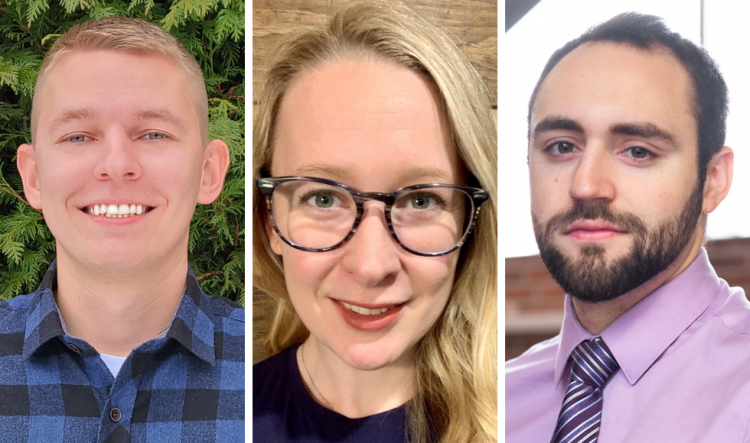
Graduate students Sergei Filiasov, Cassandra D'Amore and Nicholas Simard have received fellowships from McMaster's MacDATA Institute.
Three graduate students have received fellowships from McMaster's MacDATA Institute to pursue interdisciplinary projects using new and innovative data science methodologies.
Through the fellowship, Sergei Filiasov, Cassandra D'Amore and Nicholas Simard are applying data analysis, collection and curation methodologies to their respective areas of study: decision making, aging and physical activity and concussion assessment tools.
The fellowship program is part of the MacData Institute's mission to promote innovative research and training programs related to data science, and to work with and support faculties and institutes on data issues and initiatives.
Each fellow is co-supervised by at least two faculty members who, together, cover data analytics and subject matter expertise. At least one of the supervisors is a member of the MacDATA Institute.
The newest MacDATA fellows are:
Sergei Filiasov
Minimax regret for data analysis with application to clinical treatment decisions and trial design with multiple treatment intensity alternatives
Sergei Filiasov is a PhD student in the department of economics. He also holds an MSc in financial economics. He is studying the application of the minimax regret criterion, a technique used to make decisions under uncertainty, to inform decision-making. Using data from clinical trials with multiple treatments and outcomes, Filiasov is assessing the application of the minimax regret criterion to conventional statistical inference-based approaches, such as hypothesis testing.
Supervisors: Arthur Sweetman and Jean-Eric Tarride.
Cassandra D'Amore
Exploring predictors of physical activity behaviour patterns in the Canadian Longitudinal Study on Aging
Cassandra D'Amore is a PhD candidate in the School of Rehabilitation Science. Her thesis is using the Canadian Longitudinal Study on Aging (CLSA) to describe usual physical activity levels and behaviours in middle-aged and older adults. Her MacDATA fellowship work is expending this project by creating a more complete picture of physical activity patterns that may better inform physical activity promotion efforts. She is also using machine learning to identify the health-related factors that appear to be driving the prediction of physical activity behaviour patterns.
Supervisors: Paul McNicholas and Marla Beauchamp
Nicholas Simard
Anomaly detection in post-pubescent adolescent datasets for improved concussion assessment
Nicholas Simard is using neuroimaging data repositories to establish an appropriate healthy baseline reference for post-pubescent adolescents for comparison to concussed individuals. Simard is focusing on MRI data and applying a blend of machine learning models to achieve novel anomaly detection in these datasets. This research has promise for other areas of neuropathology with the establishment of healthy baselines being used to assess Alzheimer's Disease, Parkinson's Disease and Multiple Sclerosis, among other diseases.
Supervisors: Michael Noseworthy and Brian Timmons











